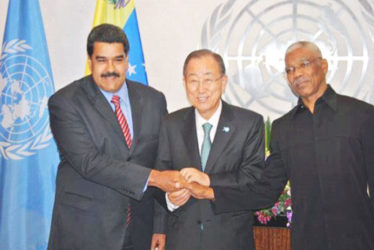In a much-anticipated decision, outgoing UN Secretary General Ban Ki-moon has decided that the Good Offices process on the decades-old border controversy between Guyana and Venezuela will be given one more year and if by the end of 2017 “significant progress” has not been made, the case will move to the International Court of Justice (ICJ).
Guyana has accepted the decision announced in a statement from the United Nations in New York yesterday and has called on the nation to support the process.
“The Government of Guyana accepts the decision of the Secretary General. We stand committed to using our best endeavours to fulfill its highest expectations,” government asserted in a statement it issued last evening.
Further, it added, “Guyana will do everything in its power to ensure that his expectations, and those of his successor to whom the mandate of implementation now falls – as well as our expectations are fulfilled. The Government calls upon all Guyanese to support the process that now lies ahead in the confidence that it will lead to a just and binding resolution of the discords that have plagued our development for so long. It is a fitting advance in this fiftieth year of our independence.”

There was no immediate reaction from Venezuela to the UN announcement.
The statement from the office of the spokesperson for Ban yesterday stated that Ban worked fervently over the year to find a way forward that would be most conducive to finding a solution. It noted that he held a trilateral meeting with President David Granger and President Nicolás Maduro of Venezuela in the margins of the 70th General Assembly.
High level missions were also dispatched to both countries and they held meetings with officials of both states.
Last month saw the Secretary General conducting an extensive stocktaking of the Good Offices Process, the statement said.
“On the basis of that stocktaking, the Secretary-General has reached the conclusion that the Good Offices Process will continue for one final year, with a new PRSG (Personal Representative of the SG) with a strengthened mandate of mediation, who will be appointed by the Secretary-General-designate shortly after he takes office,” the statement read.
“If, by the end of 2017, the Secretary-General concludes that significant progress has not been made toward arriving at a full agreement for the solution of the controversy, he will choose the International Court of Justice as the next means of settlement, unless both parties jointly request that he refrain from doing so,” it added.
The Secretary-General has discussed his decision with incoming Secretary-General António Manuel de Oliveira Guterres, and he as expressed his concurrence with them, according to the statement.
The last PRSG was Jamaican, Professor Norman Girvan who passed away in 2014. There has been no replacement since.
The Government of Guyana, in its statement yesterday, said that it has long been accepted by all Governments of this country that the best means of settlement to the controversy should be a reference of it to the International Court of Justice as it considers the controversy “to be essentially a legal question and one eminently susceptible to a legal process of settlement”.
Government informed that it stands committed to using its best endeavours to fulfill its highest expectations and will be formally writing to the outgoing Secretary General, as well as to the President of Venezuela, to indicate their acceptance of the decision.
“We believe that, in taking this decision, the Secretary General has remained loyal to the sacred mission of the United Nations to uphold the law and maintain the peace between nations – small and large. Guyana will do everything in its power to ensure that his expectations, and those of his successor to whom the mandate of implementation now falls – as well as our expectations are fulfilled,” the Guyana Government’s statement said.
It added that the UN decision heralded a “new point of promise in our relations” with Venezuela.
Judicial settlement
For the last two years, Guyana has been pressing for a judicial settlement of the controversy, arguing that the Good Offices process has yielded no progress in decades and that Caracas continues to destabilise this country’s progress. Georgetown had argued that for its entire 50 years of independence, Venezuela has used the border controversy to undermine this country’s development.
The appeal for a judicial settlement was upped when President Granger was elected to office in May of 2015. His accession to office coincided with the issuing of a maritime decree by the Maduro administration seeking to claim almost all of Guyana’s Atlantic waters. Guyana launched a diplomatic offensive to isolate Caracas and pressure it to resile from its increasingly hostile stance. At the same time, Guyana formally wrote Secretary General Ban appealing for a judicial settlement to the controversy, as catered for under the 1966 Geneva Agreement. Venezuela has sought a continuation of the Good Offices process and opposes a move to the ICJ.
Relations between Georgetown and Caracas have deteriorated over the last 18 months since the embattled Venezuelan President issued the decree laying claim to most of Guyana’s Atlantic waters.
The Venezuelan decree had followed closely on the heels of an announcement by US Company Exxon Mobil of a significant oil find in Guyana’s waters off the Demerara coast. The Venezuelan decree laid claim to this area.
This sparked a vigorous campaign led by Granger to internationalise the issue and up the pressure on Caracas to withdraw the decree. Caracas later withdrew the decree and issued a new one which Guyana still found objectionable.
Subsequently, last September, Granger and Maduro met the UN Secretary-General and agreed to a number of steps.
Observers say that Ban’s decision reflects an attempt to address the concerns on both sides and his decision would be seen as a key development for Georgetown as the move towards a judicial settlement may be just a year away.





